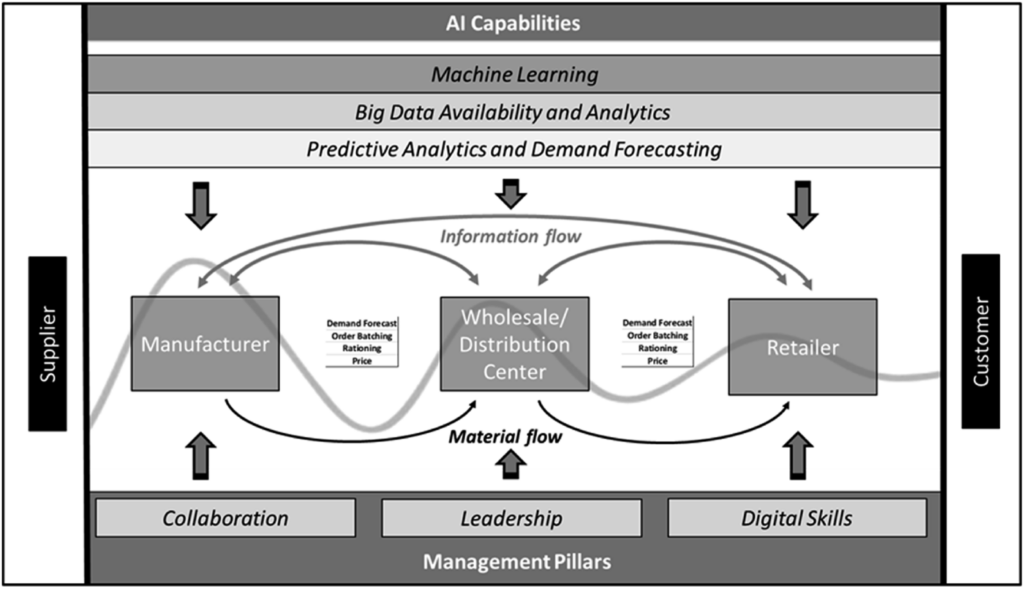Der Bullwhip-Effekt beschreibt das Phänomen, bei dem kleine Nachfrageschwankungen auf Verbraucherebene große Schwankungen entlang der Lieferkette verursachen. Diese führen zu Überproduktion, hohen Lagerbeständen und ineffizienten Prozessen. In der heutigen komplexen Geschäftswelt ist es entscheidend, den Bullwhip-Effekt zu verstehen. Nur so kann eine effiziente und stabile Lieferkette gewährleistet werden. Künstliche Intelligenz (KI) bietet eine vielversprechende Lösung. Sie kann helfen, den Bullwhip-Effekt zu glätten und die Lieferkette stabiler zu gestalten.
Der Bullwhip-Effekt in Lieferketten: Herausforderungen und Lösungen durch KI
Der Bullwhip-Effekt verstärkt Nachfrageschwankungen in der Lieferkette und verursacht Ineffizienzen wie Überproduktion, hohe Lagerbestände und schlechten Kundenservice. Weisz, Herold und Kummer betonen, dass dieses Problem aus der Managementperspektive angegangen werden muss. Sie argumentieren, dass KI eine Schlüsselrolle bei der Reduzierung dieser Schwankungen spielt.
Die Rolle der KI im Lieferkettenmanagement zur Reduzierung des Bullwhip-Effekts
Laut den Autoren kann KI den Bullwhip-Effekt abmildern, indem sie wichtige Managementpfeiler verbessert. Diese beinhalten Zusammenarbeit, Führung und digitale Fähigkeiten. Diese Säulen sind für die erfolgreiche Integration von KI in Lieferketten entscheidend.
1. Zusammenarbeit: KI kann eine bessere Zusammenarbeit fördern, indem sie die Kommunikation und den Datenaustausch zwischen den Partnern der Lieferkette verbessert. Die Studie weist jedoch darauf hin, dass das Potenzial der KI für die Zusammenarbeit zwar klar ist, die Rolle der KI beim Aufbau von Vertrauen zwischen den Mitgliedern der Lieferkette jedoch nur begrenzt erforscht ist. Vertrauen ist ein entscheidendes Element für jede effektive Zusammenarbeit. Künftige Forschungen sollten sich darauf konzentrieren, wie KI dazu beitragen kann, vertrauensbezogene Herausforderungen zu bewältigen.
Leadership: Strong leadership is essential for the successful adoption of AI in supply chains. The study highlights that leaders must not only focus on the technical aspects of AI integration, but also master the human dimensions, including change management and managing organizational dynamics.
3. Digitale Fertigkeiten: Damit KI effektiv eingesetzt werden kann, müssen Unternehmen in den Aufbau einer digital qualifizierten Belegschaft investieren. Weisz, Herold und Kummer weisen auf die wachsende digitale Qualifikationslücke hin. Sie argumentieren, dass Unternehmen der Weiterbildung Vorrang einräumen müssen, um KI-getriebene Innovationen in der Lieferkette zu bewältigen. Dieser Fokus auf digitale Kompetenzen ist entscheidend für den langfristigen Erfolg.

Wichtige Forschungslücken zur KI-gestützten Glättung des Bullwhip-Effekts
Die Studie weist auf mehrere Forschungslücken hin, die es weiter zu untersuchen gilt:
The role of AI in addressing the bullwhip effect: While much attention has been paid to the technical applications of AI, less attention has been paid to its role in smoothing the bullwhip effect from a managerial perspective. The authors suggest that frameworks such as their proposed Bullwhip Smoothing Framework (BSF) could form a basis for future studies.
Trust and collaboration in AI-enabled supply chains: Although collaboration is a key factor in reducing the bullwhip effect, there is limited research linking AI to collaborative practices. Further studies are needed to investigate how AI can build trust and manage conflicts of interest between supply chain members.
Leadership and digital skills for AI integration: The study finds that there is a lack of detailed research on the specific leadership and digital skills required for successful implementation of AI in supply chains. Future work should examine the structural changes and skill requirements needed for this transition.
Theoretische und praktische Beiträge zur KI-Integration in Lieferketten
Theoretical implications: The study makes an important contribution by extending the theories of supply chain management to include the role of AI in combating the bullwhip effect. The authors propose the BSF as a tool to analyze how AI can smooth the bullwhip phenomenon by focusing on collaboration, leadership, and digital capabilities.
Practical implications: From a practical perspective, the authors emphasize that the introduction of AI alone is not enough to eliminate the bullwhip effect, but that it must be supported by strong management practices. Leaders need to develop transparent, ethical frameworks for the use of AI while ensuring that AI performance metrics are aligned with organizational goals.
Ein Aufruf zur weiteren Erforschung der KI im Kampf gegen den Bullwhip-Effekt
The study by Weisz, Herold and Kummer is an important first step in understanding how AI can mitigate the bullwhip effect in supply chains. However, as the authors themselves emphasize, the integration of AI into supply chain management is still at an early stage. There are many opportunities for further research, particularly in the areas of AI-driven collaboration, leadership and digital capability development.
As AI continues to evolve and become more integrated into supply chains, organizations that can effectively manage these three key pillars will be best positioned to reduce inefficiencies and respond to market demands. At Circlly, we are dedicated to staying at the forefront of these technological advances and providing insights on how organizations can adapt to the future of supply chain management.
For a deeper dive into the original research, you can check out the full study “Revisiting the Bullwhip Effect: How Can AI Smoothen the Bullwhip Phenomenon?” by Eric Weisz, David M. Herold and Sebastian Kummer.
Would you like to learn more about the optimization of your supply chain?
Contact us and arrange a personalised and non-binding consultation with our management.